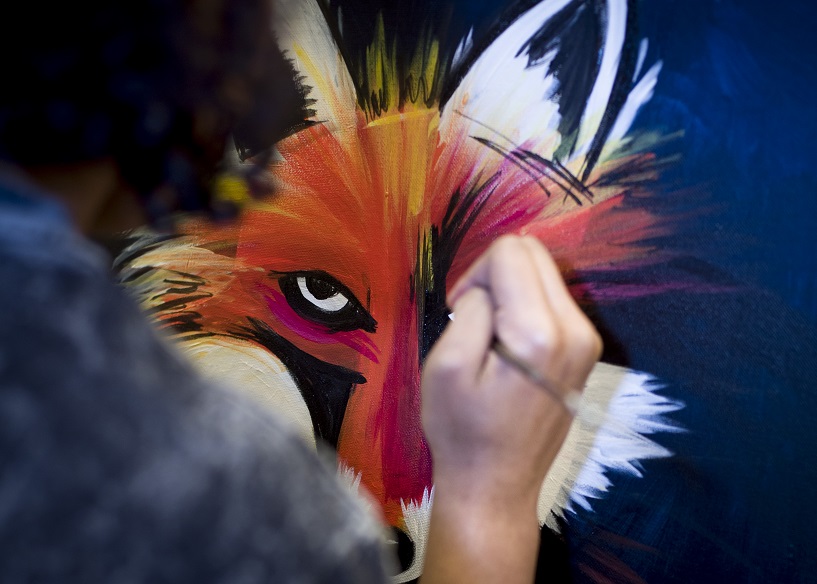
Class Overview
Acrylic painting can provide a lifetime of enjoyment. Learn how to express yourself using the vibrant colors of this delightful paint.
Discover how to use the basic techniques of acrylic painting: blending, texturizing, brush handling, detailing, stippling, glazing, wet in wet, and alla prima. Learn about color mixing, complementary colors, warm and cool, hue, value, intensity, and proportions.
You will be surprised how quickly your skills will improve by observing the instructor and painting along, during step-by-step class presentations. The format will make it easy to get started and build upon what you learn, gaining new techniques and putting them directly into practice. As you develop these skills, you’ll find them becoming second nature.
Enjoy the satisfying ability to represent the world around you in liquid colors, as you create unique works of art.
This class is part of our Broadway Hill Club offerings, designed for older students and offered during the daytime on diverse topics, though students of all ages are welcome.
Learning Objectives
- Color mixing: proportions, hue, value, intensity, complementary colors, and warm/cool
- Using color schemes to add extra interest to your paintings: monochromatic, analogous, complementary, split complementary, and triadic
- Techniques such as blending, texturizing, and detailing; might include stippling, glazing, washes, alla prima, dry brushing, impasto, swirling and dabbing, etc.
- Various painting styles such as realistic, impressionistic, abstract, etc.
- Ability to paint a variety of subject matter such as animals, plants, landscapes, still life, etc.
- Represent 3-dimensional form in painting, in both black and white and in color, by using value, contrast, light, and shadow
- Atmospheric perspective makes entire scenes and landscapes appear more 3 dimensional, with the illusion of depth and space
- Apply proportion and perspective to your paintings
Who Might Enjoy This Class
- Anyone who is interested in enriching their lives with the joy of painting
- People who would like to gain or improve their painting skills and apply those skills to paint a variety of subject matter
- Anyone who would like a creative outlet and learn to express themselves through painting
- Budding artists who would like to gain the foundational skills of painting to apply to any visual art medium
- Seniors looking for interesting activities to do with other seniors and community members
- People interested in daytime classes
- No experience is necessary; everyone is welcome!
Supplies Needed
PALETTE:
- 1 disposable palette pad 9x12” or 12x16” (or paper plates for the first day)
BRUSHES
- Long-handled brushes are preferable – you can use short-handled brushes if you already have them - white nylon or brown taklon bristles
- Round brushes: #1 or #2 - (1/16" or 1/32" wide)
- Filbert brushes: 2-3 at least
- A small and a large: 1/8", 1/4", 3/8", 1/2"
- Flat: 1" wide
- Angle brush (optional): small - 1/4" wide, or less
CANVASES
- 2-4 canvases in a size like 11x14”, 12x16”, 14x18”, or 16x20” – depending on preference and availability (students often like to start with smaller canvases and then go up in canvas size as the class goes on)
- One 9x12” watercolor pad, 120 lb for practices and exercises (or 3-5 sheets of watercolor paper)
PAINTS
Examples of brands, student-grade: Liquitex Basics, Galeria, Grumbacher Academy, Utrecht, Pebeo
Colors:
Titanium white, any light yellow (examples: cadmium yellow light hue, Acra or Hansa yellow light, light yellow, or lemon yellow), any medium yellow: (cadmium yellow medium hue, Acra or Hansa yellow medium, or medium yellow), any medium red: (cadmium red medium hue, Acra or Hansa red medium, or medium red), magenta, ultramarine blue, phthalo blue, Mars black
Optional (recommended) Colors:
Any medium orange: (cadmium orange medium hue, Acra or Hansa orange medium, or medium orange), dioxazine purple, phthalo green, burnt sienna, burnt umber
OTHER SUPPLIES
- Water jars, glass or plastic (such as peanut butter, yogurt, cottage cheese, etc or large plastic cups or containers)
- Paper towels
- Pencil: 2B or HB
- White vinyl eraser (or pink pearl)
- Sharpener (preferably with shavings catcher)
- Optional: palette knives (plastic or metal)